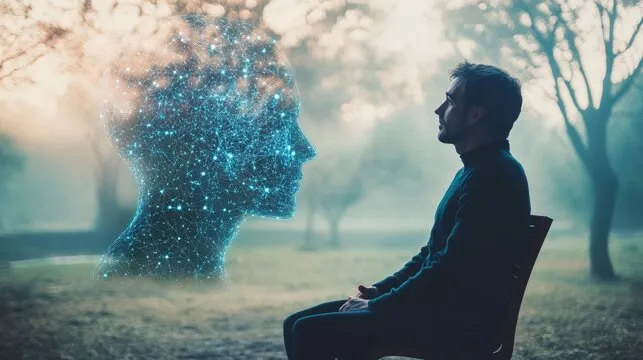The Role of AI in Mental Health Therapy
Mental health therapy has traditionally been a field that relies on human-to-human interaction. However, with the rise of Artificial Intelligence (AI), there is a significant shift in how people access and receive mental health support. AI-powered therapy is rapidly transforming the landscape, offering accessibility, affordability, and efficiency. But is AI a reliable alternative to human therapists? Let’s explore the impact of AI in mental health therapy and what it means for the future.
The Increasing Use of AI in Mental Health Therapy
AI is no longer just a futuristic concept—it is actively being used in mental health care today. Several AI-driven platforms and tools are providing psychological support, diagnosing mental health conditions, and even assisting therapists.

1. How AI is Used in Mental Health Therapy
- Chatbots and Virtual Therapists: AI-powered chatbots like Woebot, Wysa, and Replika provide conversational support for individuals dealing with anxiety, depression, and stress. These bots use Natural Language Processing (NLP) to understand and respond empathetically.
- AI-Powered Mental Health Apps: Apps like Youper, Moodpath, and Sanvello use AI to track users’ moods, offer cognitive behavioral therapy (CBT) techniques, and provide self-help tools.
- AI in Diagnosing Mental Health Conditions: AI algorithms analyze speech patterns, facial expressions, and biometric data to detect early signs of depression, PTSD, and other disorders.
- AI for Personalized Treatment Plans: Machine learning models process large amounts of patient data to recommend personalized therapy techniques and medication plans.
2. Benefits of AI in Mental Health Therapy
AI is revolutionizing the field of mental health therapy in many ways:
- 24/7 Availability: Unlike human therapists, AI-based chatbots and virtual therapists are available round-the-clock, making mental health support more accessible.
- Affordability: Traditional therapy can be expensive. AI-powered mental health tools are often free or cost significantly less.
- Anonymity and Comfort: Many people hesitate to seek therapy due to social stigma. AI-powered chatbots provide a judgment-free space for users to express their feelings.
- Data-Driven Insights: AI collects and analyzes user behavior, allowing for data-driven decisions in mental health care.
- Faster Diagnosis: AI can detect patterns and symptoms in real-time, leading to quicker and more accurate mental health assessments.

The Challenges and Ethical Concerns of AI in Mental Health Therapy
Despite its many benefits, the integration of AI in mental health therapy comes with challenges and concerns.
1. Can AI Replace Human Therapists?
While AI can assist in therapy, it cannot replace the empathy, understanding, and deep connection that human therapists provide. Many mental health issues require face-to-face interaction and personalized human intervention.
2. Accuracy and Reliability Issues
- AI-based tools rely on algorithms and databases. If the data is biased or incorrect, the AI’s recommendations could be misleading or even harmful.
- Misinterpretation of emotions and text by AI chatbots can lead to incorrect advice.
3. Privacy and Data Security Concerns
- AI Mental Health Therapy platforms collect sensitive personal data. A data breach could put users at risk.
- Users may not be fully aware of how their data is being used or shared.
4. Ethical Considerations
- Should AI be allowed to make mental health diagnoses without human oversight?
- Is it ethical for AI-driven therapy apps to replace human therapists in certain cases?
- How can we ensure AI remains unbiased and does not reinforce harmful stereotypes?
The Future of AI in Mental Health Therapy
AI is not here to replace human therapists but to support and enhance mental health care. The future of AI in therapy looks promising with several advancements on the horizon:
1. AI and Human Therapists Working Together
- AI can be used as a first point of contact before directing patients to human therapists.
- AI-driven insights can help therapists better understand their patients’ needs.
2. Improved AI Emotional Intelligence
- Researchers are working on AI models that can detect emotions more accurately.
- AI could eventually recognize subtle changes in tone and language to provide better responses.
3. Regulation and Ethical AI Development
- Governments and mental health organizations are working on regulations to ensure ethical AI use.
- More transparent data privacy policies will help users feel safer using AI-driven therapy.

Conclusion: The Balance Between AI and Human Care
The increasing use of AI in mental health therapy is both exciting and challenging. While AI offers accessibility, affordability, and efficiency, it lacks the human empathy necessary for deeper emotional healing. The key is to find a balance where AI supports, rather than replaces, human therapists. With continuous improvements and ethical considerations, AI can become a powerful tool in making mental health care more inclusive and effective for everyone.
Keywords: AI in therapy, artificial intelligence, mental health support, AI chatbots, virtual therapy, mental health apps, therapy technology, AI diagnosis, ethical concerns in AI, future of AI in mental health.
Cold Exposure Therapy: 10 Surprising Benefits & Hidden Dangers You Must Know!






